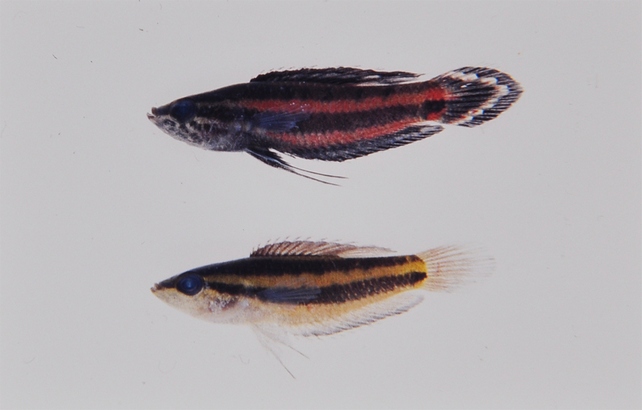No area of biology can ignore genetics today

The genetic research on fish certainly lags behind significantly regarding time and extent compared to the research on many plants or on several other groups of animals (e.g. birds). For licorice gouramis it started only a few years ago.
There are two main methods used here. The first classical method is very complex and expensive and is based on sequencing the entire DNA. Therefore it can only be carried out at universities or major museums and only in special cases. A significant economical interest was for example to know the genetic informatio
n of important food fish and thus the priorities were set here. So called ornamental fish have only been investigated to a limited extent, but at least, some of them were licorice gouramis. This method has been applied at the Natural History Museum London; the researcher was Lukas Rüber.
The second method is far less expensive, although still complex, compared with the methods of classical phenological taxonomy. It has been shown that the investigation of a short part of the DNA is sufficient for the characterisation of a species – it is not necessary to carry out the tedious sequencing of the rest of the whole DNA chain. This method is applied mainly by the so called “Fish BOL Group”, based in Guelph/Canada. This group has the target to cover the earth´s complete fish fauna in this way – an elusive objective because at present we do not even know all fish species. The licorice gouramis are the best example.
Facing the difficulties with the phenological separation of species and varieties, the Parosphromenus project is very much interested in finally obtaining reliable genetic information about our fish. Thus it cooperates with both research traditions. Between 2005 and 2009 more then 250 licorice gouramis of almost all species, but also of further unspecified forms, have been investigated according to the Fish-BOL-Method in Guelph by Dirk Steinke. The results are available, but have not been published and evaluated yet. We will report about it as soon as this is done. From 2010 onwards, Lukas Rüber, who is also a member of our scientific advisory board, will carry on with genetic research on Parosphromenus in London following the conservative methodology.
(PF)

